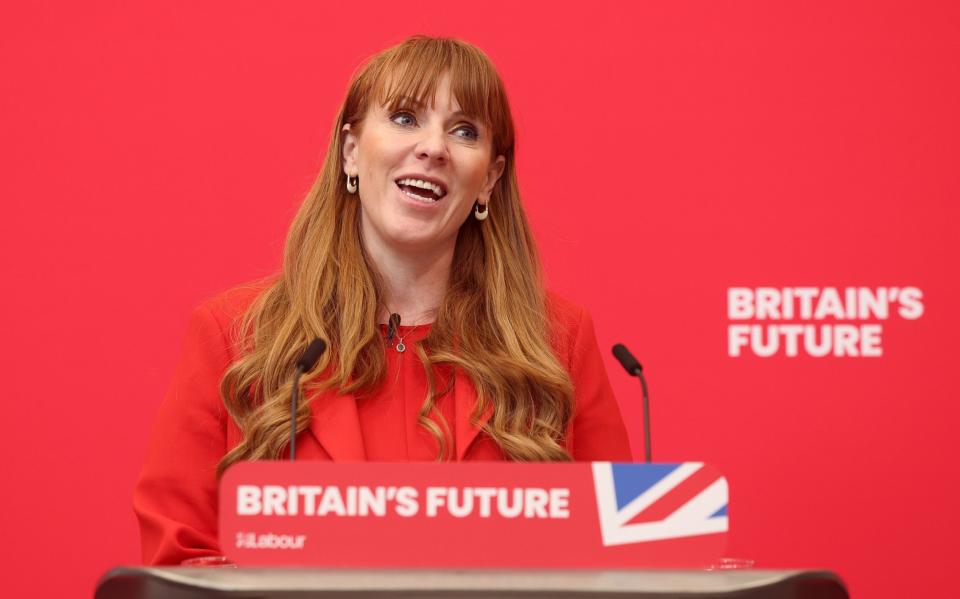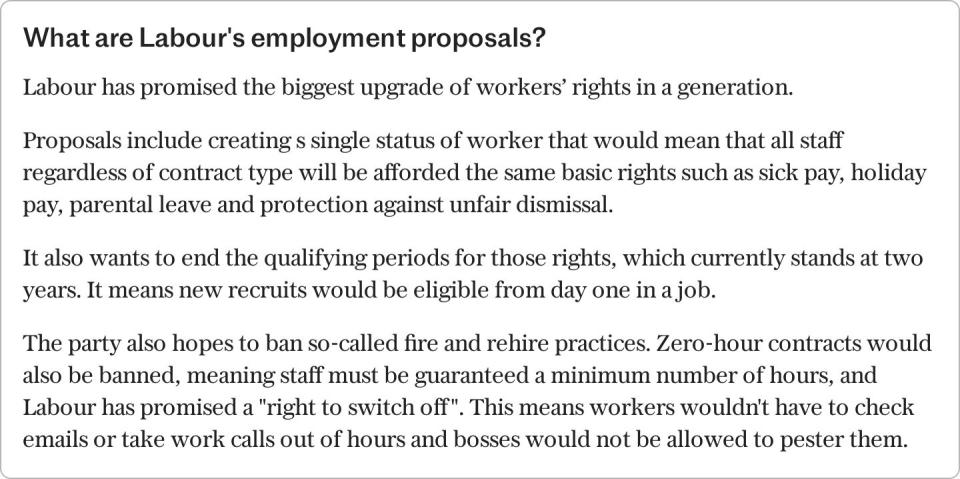Labour waters down late-night work email ban championed by Angela Rayner

Labour is preparing to announce watered-down plans for a ban on late-night office emails after softening a workers’ rights package championed by Angela Rayner.
The party is expected to reveal that it has ditched plans for a legal “right to switch off” from work emails and calls out of hours, instead including the rule in a code of practice for companies over a certain size.
It is also expected to make clear that companies will still be able to fairly sack workers under its ‘day one’ workers’ rights, which protects staff from unfair dismissal.
Labour will also allow workers to opt for zero hours contracts if they choose them, rather than banning the employment agreements outright.
The softer proposals are likely to be welcomed by businesses after months of lobbying but risk being interpreted as a defeat for Ms Rayner, the Labour deputy leader, who has previously vowed to deliver the “biggest levelling-up of workers’ rights in decades”.

Labour insiders said the renewed package of reforms will simply spell out more clearly policies that were discussed with businesses and unions last summer and will not show any significant departure from what was already agreed.
But it triggered immediate criticism from trade unions and the left of the party, who warned that any backtracking would be a betrayal.
Mick Lynch, general secretary of the RMT transport union, said: “Labour must not bend the knee to corporate greed.
“Working people need a Labour government that will protect them from the excesses of business, not one that kowtows to the vested interests of the super-rich.
“Any attempt to water down this popular policy will be met with a robust response from the entire trade union movement.”
A spokesman for Momentum, the left-wing Labour campaign group, said that any changes would be “beyond disappointing” and added: “Once again, the labour movement and the public are united behind a desire for transformative change, but they are being let down by a Labour leadership more interested in pleasing big business.”
A spokesman for the trade union Unison said: “Keir Starmer has made clear the new deal will happen. That’s because he knows the promised package of employment measures is the right thing to do for the UK’s struggling economy and for hard-pressed working people too.
“Consolidating the expected measures is fine, but any watering down of the contents won’t be.”
Ms Rayner and Sir Keir Starmer have repeatedly vowed to deliver a major overhaul of workers’ rights, but Labour insiders have admitted in recent months that party officials had “not done a great job of being super clear” with business about the changes.
Lobbyists have been urging Labour to tread carefully with their reforms, which it has said include creating a single status of worker that would mean all staff are afforded the same basic rights from day one in a job.
The changes to the “right to switch off” plans are expected to mean companies are less likely to risk a legal penalty for any breach.
Instead of being written into law, the rule is expected to be included in the existing Advisory, Conciliation and Arbitration Service (ACAS) codes of practice for employers. France, Italy, Ireland and Belgium have adopted a similar approach.
Labour also said it planned to end zero-hour contracts, ban fire and rehire practices, increase minimum wage and beef up laws that block companies from blacklisting union workers.
The Confederation of British Industry (CBI) and other major business groups met with Ms Rayner last week to discuss the party’s workers rights plans.
Behind the scenes shadow ministers have been debating how to tone down some of the pledges to ease employer fears following talks with executives, sources told the Financial Times, which first reported that a finessed package of measures will soon be published.
Allen Simpson, the deputy chief executive of UK Hospitality, said he had attended five or six meetings with senior Labour officials this year alone and had discussed the workers rights plans in depth.
He added: “It’s not just language, there has been a change in the detail of the thinking. I really would stress that this is what politics is supposed to look like. I’m always grateful to any politician willing to dig into the detail to make it work.”
Mr Simpson added that he had told Labour zero-hours contracts were “in the actual employees’ interest” where it allowed people to work flexibly should they wish to.
He said: “What we were saying is that the question shouldn’t be how do you stop flexible working [hours] but how do you stop exploitative behaviour?”
A Labour spokesman said the workers rights reforms remains a core part of its offer to the country, with details on how it would work in practice agreed last summer and a promise to consult widely on certain policies unchanged.
The move follows months of pressure from senior executives. The chairman of Marks & Spencer last month told The Telegraph that Britain risks being unable to attract investment if a Labour election victory results in an overhaul of worker rights.
A Labour insider said the workers rights reforms are “not something we’re shirking away from” as it is “popular with voters”.

 Yahoo Finance
Yahoo Finance 